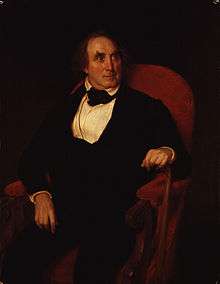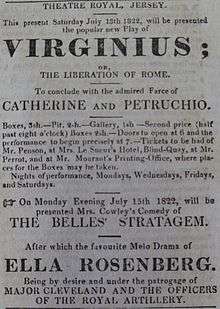James Sheridan Knowles
| James Sheridan Knowles | |
|---|---|
 James Sheridan Knowles by Wilhelm Trautschold | |
| Born | Cork, Ireland |
| Died | Torquay, England |
| Occupation | Dramatist and actor |
| Spouse | Maria Charteris |
James Sheridan Knowles (12 May 1784 – 30 November 1862) was an Irish dramatist and actor.
Biography
Knowles was born in Cork. His father was the lexicographer James Knowles (1759–1840), cousin of Richard Brinsley Sheridan. The family moved to London in 1793, and at the age of fourteen Knowles published a ballad entitled The Welsh Harper, which, set to music, was very popular. His talents secured him the friendship of William Hazlitt, who introduced him to Charles Lamb and Samuel Taylor Coleridge. He served for some time in the Wiltshire and afterwards in the Tower Hamlets militia, leaving the service to become a pupil of Dr Robert Willan (1757–1812). He obtained the degree of M.D., and was appointed vaccinator to the Jennerian Society.
Although Dr Willan offered him a share in his practice, Knowles decided to give up medicine for the stage, making his first appearance as an actor probably at Bath, and played Hamlet at the Crow Theatre, Dublin. At Wexford he married, in October 1809, Maria Charteris, an actress from the Edinburgh Theatre. In 1810 he wrote Leo, a successful play in which Edmund Kean appeared; another play, Brian Boroihme, written for the Belfast Theatre in the next year, attracted crowds; nevertheless, Knowles's earnings were so small that he was obliged to become assistant to his father at the Belfast Academical Institution. In 1817 he moved from Belfast to Glasgow, where, besides keeping a flourishing school, he continued to write for the stage.
His first important success was Caius Gracchus, produced at Belfast in 1815; and his Virginius, written for Edmund Kean, was first performed in 1820 at Covent Garden. In William Tell (1825), Knowles wrote for William Charles Macready one of his favourite parts. His best-known play, The Hunchback, was produced at Covent Garden in 1832, and Knowles won praise acting in the work as Master Walter.[1] The Wife was brought out at the same theatre in 1833; and The Love Chase in 1837.
In his later years he forsook the stage for the pulpit, and as a Baptist preacher attracted large audiences at Exeter Hall and elsewhere. He published two polemical works: the Rock of Rome and the Idol Demolished by Its Own Priests in both of which he combated the special doctrines of the Roman Catholic Church. Knowles was for some years in the receipt of an annual pension of £200, bestowed by Sir Robert Peel in 1849.[2] In old age he befriended the young Edmund Gosse, whom he introduced to Shakespeare. Knowles makes a happy appearance in Gosse's Father and Son.[3] He died at Torquay on 30 November 1862.
A full list of the works of Knowles and of the various notices of him will be found in the The Life of James Sheridan Knowles (1872), privately printed by his son, Richard Brinsley Knowles (1820–1882), who was well known as a journalist. It was translated into German.[4]
Works

- Plays
- Leo; or, The Gipsy (1810)
- Brian Boroihme; or, The Maid of Erin (1811)[5]
- Caius Gracchus (1815)[6]
- Virginius (1820) A Tragedy in Five Acts[7]
- William Tell (1825)[8]
- The Beggar's Daughter of Bethnal Green (1828)[9]
- Alfred the Great; or The Patriot King (1831)[8]
- The Hunchback (1832)[10]
- A Masque (in one act and in verse on the death of Sir Walter Scott) (1832)[4]
- The Wife; A Tale of Mantua (1833)[8]
- The Beggar of Bethnal Green (1834)[8]
- The Daughter (1837)[8]
- The Love Chase (1837)[11]
- Woman's Wit; or, Loves Disguises (1838)[12]
- The Maid of Mariendorpt (1838)[13]
- Love (1839)[14]
- John of Procida; or, The Bridals of Messina (1840)[15]
- Old Maids (1841)[16]
- The Rose of Arragon (1842)[17]
- The Secretary (1843)[18]
- The Bridal (1847) (An adaptation of The Maid's Tragedy)[4]
- Alexina; or, True unto Death (1866)[19]
Novels and short stories
- The Magdalen and Other Tales (1832)[20]
- Fortescue (1847)[21]
- George Lovell (1852)
- Old Adventures (1859)
- Tales and Novelettes etc. (1874)
Poetry
- A Collection of Poems on Various Subjects (1810)[22]
- Fugitive Pieces
- The Senate, or Social Villagers of Kentish Town, a Canto (1817)
Theological writings
- The Rock of Rome; or, The Arch Heresy (1849)[4]
- The Idol Demolished by Its Own Priest (1852)[4] (An answer to Cardinal Wiseman's Lectures on Transubstantiation.)
- The Gospel Attributed to Matthew in the Record of the Whole Original Apostlehood (1855)[4]
Non-fiction
- The Elocutionist (1831)[23] (A collection of pieces in prose and verse; peculiarly adapted to display the art of reading...)
- A Treatise on the Climate of Madeira (1850)
- The Debater's Handbook (1862)[24]
- Lectures on Dramatic Literature (1875)[25]
References
- ↑ Stedman, Jane W. "General Utility: Victorian Author-Actors from Knowles to Pinero", Educational Theatre Journal, Vol. 24, No. 3, October 1972, pp. 289–301, The Johns Hopkins University Press
- ↑ Appletons' annual cyclopaedia and register of important events of the year: 1862. New York: D. Appleton & Company. 1863. p. 543.
- ↑ Edmund Gosse, Father and Son (2004) pp122-123, OUP
- 1 2 3 4 5 6 Ludwig Hasberg (1883) James Sheridan Knowles' Leben und dramatische Werke, Lingen, Hanover (Google eBook) (German)
- ↑ Brian Boroihme; or, The Maid of Erin (eBook)
- ↑ Caius Gracchus (Google Books)
- ↑ Virginius (Google Books)
- 1 2 3 4 5 The dramatic works of James Sheridan Knowles Volume 1 (1856)
- ↑ The Beggar's Daughter of Bethnal Green (Google eBook)
- ↑ The Hunchback (Google Books)
- ↑ The Love Chase (Google eBook)
- ↑ Woman's Wit (Google Books)
- ↑ The Maid of Mariendorpt (Google Books)
- ↑ Love
- ↑ John of Procida; or, The Bridals of Messina (Google Books)
- ↑ Old Maids (Google Books)
- ↑ The Rose of Arragon (Google Books)
- ↑ The Secretary (Google Books)
- ↑ True unto Death
- ↑ The Magdalen and Other Tales (Google eBook)
- ↑ Fortescue (Google eBook)
- ↑ A collection of poems on various subjects (Google eBook)
- ↑ The Elocutionist (Google eBook)
- ↑ The Debater's Handbook (Google Books)
- ↑ Lectures on dramatic literature (Google eBook)
Other sources
-
 This article incorporates text from a publication now in the public domain: Chisholm, Hugh, ed. (1911). "Knowles, James Sheridan". Encyclopædia Britannica (11th ed.). Cambridge University Press.
This article incorporates text from a publication now in the public domain: Chisholm, Hugh, ed. (1911). "Knowles, James Sheridan". Encyclopædia Britannica (11th ed.). Cambridge University Press.
External links
- Works by James Sheridan Knowles at Project Gutenberg
- Works by or about James Sheridan Knowles at Internet Archive
-
 "Knowles, James Sheridan". Dictionary of National Biography. London: Smith, Elder & Co. 1885–1900.
"Knowles, James Sheridan". Dictionary of National Biography. London: Smith, Elder & Co. 1885–1900.